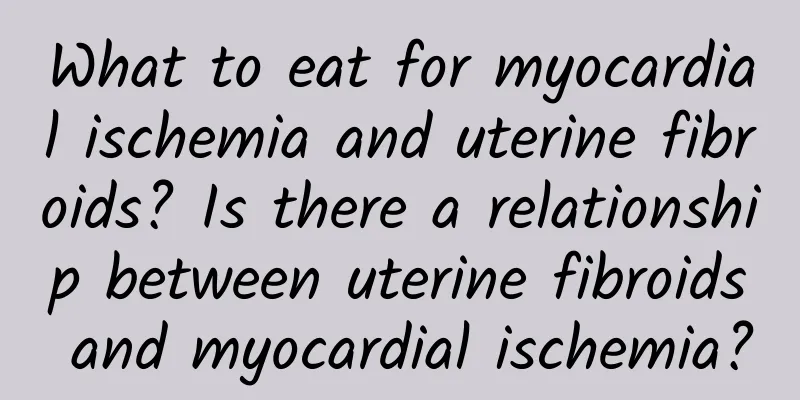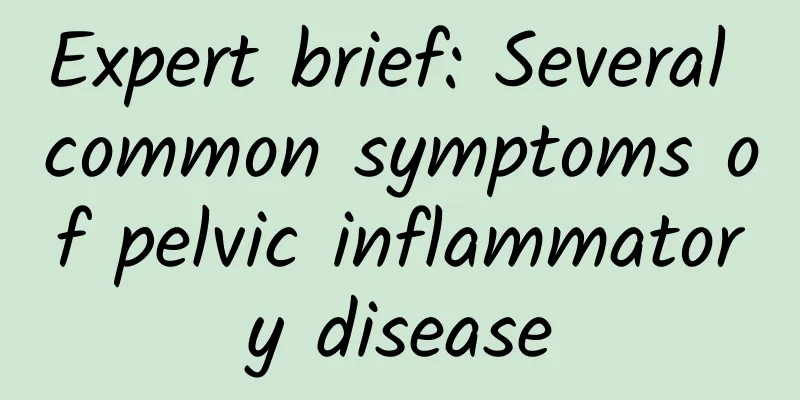What to eat for myocardial ischemia and uterine fibroids? Is there a relationship between uterine fibroids and myocardial ischemia?

|
What to eat for myocardial ischemia and uterine fibroids? Is there a relationship between uterine fibroids and myocardial ischemia? Uterine fibroids are a common disease in women, and myocardial ischemia refers to insufficient blood supply to the heart. Although the two seem to have no direct connection, there is a certain correlation between them. This article will explore the relationship between uterine fibroids and myocardial ischemia, and give some dietary suggestions that can help improve these two conditions. Uterine fibroids refer to benign tumors that occur in the uterine wall or myometrium. Although uterine fibroids themselves do not cause myocardial ischemia, they can indirectly affect heart health. Uterine fibroids can cause uterine bleeding, anemia, and thus affect the blood supply to the heart. Severe anemia can lead to myocardial ischemia, causing symptoms such as angina pectoris. So how can we improve both of these situations? Here are some suggestions: 1. Maintain a balanced diet. Diet is very important for improving heart health and the symptoms of uterine fibroids. It is recommended to consume a variety of foods, including vegetables, fruits, whole grains, and proteins. It is very necessary to reduce the intake of red meat and high-fat foods. 2. Increase your intake of dietary fiber. Dietary fiber helps lower cholesterol levels and reduce the risk of atherosclerosis, thereby improving cardiovascular and cerebrovascular health. In addition, dietary fiber can promote intestinal peristalsis, prevent digestive problems such as constipation, and help alleviate the symptoms of uterine fibroids. It is recommended to consume high-fiber foods such as beans, grains, and fresh vegetables. 3. Control the salt intake in your diet. Excessive intake of salt will increase blood pressure levels, increase the burden on the heart, and increase the risk of myocardial ischemia. Similarly, excessive salt intake will also cause edema and aggravate the symptoms of uterine fibroids. Therefore, it is recommended to limit salt intake and increase potassium intake appropriately, such as eating some potassium-rich foods such as bananas and potatoes. 4. Increase the intake of omega-3 fatty acids. Omega-3 fatty acids are very important for heart health. They can lower cholesterol levels, reduce the risk of atherosclerosis, and prevent myocardial ischemia. In addition, some studies have found that omega-3 fatty acids also have a certain inhibitory effect on uterine fibroids. It is recommended to consume foods rich in omega-3 fatty acids, such as fish and flax seeds. In summary, although uterine fibroids and myocardial ischemia seem to have no direct relationship, uterine fibroids can indirectly affect heart health. By controlling diet, increasing the intake of dietary fiber and omega-3 fatty acids, and limiting salt intake, heart health can be improved and the symptoms of uterine fibroids can be relieved. Of course, in the face of these two situations, it is also necessary to follow the doctor's advice and undergo treatment and surgery in a timely manner. |
<<: Why do we need to do curettage for adenomyoma? How to treat adenomyoma?
Recommend
Overview of Dysmenorrhea
Any periodic lower abdominal pain, pain in the lu...
Pelvic peritonitis can be relieved by soaking flower tea
Whether it is a patient with pelvic peritonitis o...
What you need to know if you want to lose weight! 4 great skills to help you lose weight
In this unit, I helped everyone summarize the eff...
Several common clinical manifestations of adnexitis
What are the clinical manifestations of adnexitis...
Morbid obesity may lead to sleep apnea! The hot girl lost 52 kg and resumed cosplay
Obesity is the root of all diseases! When BMI ≥ 2...
What to do if your waist and abdomen are enlarged? 6 exercises to reduce belly fat
My BMI is obviously within the standard and my li...
Losing weight and becoming flat-chested? 3 tricks to sculpt an S curve
The weather is getting warmer, and spring and hot...
What are the early symptoms of ovarian cysts?
What are the early symptoms of ovarian cysts? Exp...
The secret to losing fat in 2 months: weight training + squats
Those who have been to Japan have probably seen t...
What are the symptoms and hazards of adenomyosis?
Treatment of adenomyosis can relieve symptoms thr...
What harm does uterine fibroids cause to the body
Uterine fibroids can cause many kinds of harm to ...
Treatment measures for shock in patients with ectopic pregnancy
Patients with ectopic pregnancy suffer from acute...
Do some exercise to relieve menstrual cramps
Dysmenorrhea is a common gynecological disease. M...
Analysis of effective nursing methods for pelvic inflammatory disease in daily clinical practice
Everyone knows that good care for pelvic inflamma...
Causes and hazards of cervical hypertrophy
Cervical hypertrophy is usually a symptom caused ...









